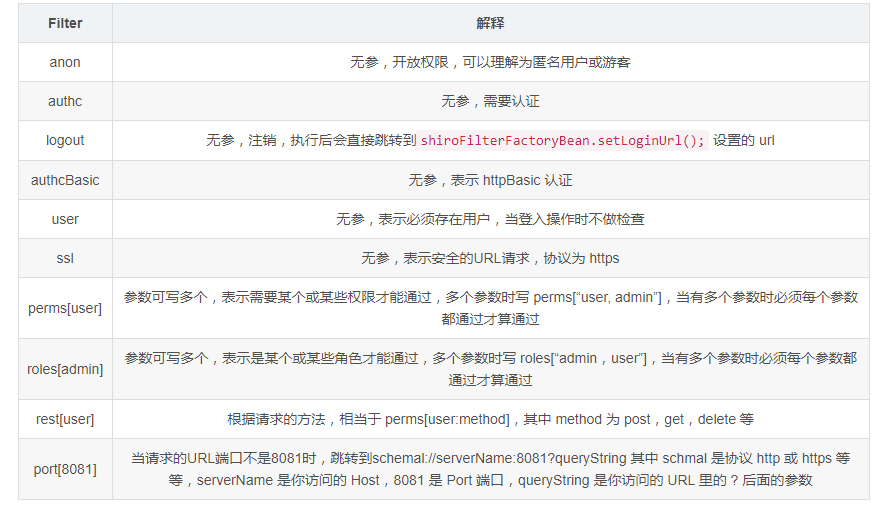springboot 整合shiro
参考:
https://blog.csdn.net/fuweilian1/article/details/80309192(推荐)
https://blog.csdn.net/weixin_38132621/article/details/80216056
https://www.cnblogs.com/ll409546297/p/7815409.html#undefined
/* ------------是拦截所有的文件夹,不包含子文件夹: /** -----------是拦截所有的文件夹及里面的子文件夹:
依赖包:
<dependency>
<groupId>org.apache.shiro</groupId>
<artifactId>shiro-spring</artifactId>
<version>1.3.2</version>
</dependency>
数据库表
一切从简,用户 user 表,以及角色 role 表
Shiro 相关类
Shiro 配置类
@Configuration
public class ShiroConfig {
@Bean
public ShiroFilterFactoryBean shirFilter(SecurityManager securityManager) {
ShiroFilterFactoryBean shiroFilterFactoryBean = new ShiroFilterFactoryBean();
// 必须设置 SecurityManager
shiroFilterFactoryBean.setSecurityManager(securityManager);
// setLoginUrl 如果不设置值,默认会自动寻找Web工程根目录下的"/login.jsp"页面 或 "/login" 映射
shiroFilterFactoryBean.setLoginUrl("/notLogin");
// 设置无权限时跳转的 url;
shiroFilterFactoryBean.setUnauthorizedUrl("/notRole");
// 设置拦截器
Map<String, String> filterChainDefinitionMap = new LinkedHashMap<>();
//游客,开发权限
filterChainDefinitionMap.put("/guest/**", "anon");
//用户,需要角色权限 “user”
filterChainDefinitionMap.put("/user/**", "roles[user]");
//管理员,需要角色权限 “admin”
filterChainDefinitionMap.put("/admin/**", "roles[admin]");
//开放登陆接口
filterChainDefinitionMap.put("/login", "anon");
//其余接口一律拦截
//主要这行代码必须放在所有权限设置的最后,不然会导致所有 url 都被拦截
filterChainDefinitionMap.put("/**", "authc");
shiroFilterFactoryBean.setFilterChainDefinitionMap(filterChainDefinitionMap);
System.out.println("Shiro拦截器工厂类注入成功");
return shiroFilterFactoryBean;
}
/**
* 注入 securityManager
*/
@Bean
public SecurityManager securityManager() {
DefaultWebSecurityManager securityManager = new DefaultWebSecurityManager();
// 设置realm.
securityManager.setRealm(customRealm());
return securityManager;
}
/**
* 自定义身份认证 realm;
* <p>
* 必须写这个类,并加上 @Bean 注解,目的是注入 CustomRealm,
* 否则会影响 CustomRealm类 中其他类的依赖注入
*/
@Bean
public CustomRealm customRealm() {
return new CustomRealm();
}
}
注意:里面的 SecurityManager 类导入的应该是 import org.apache.shiro.mgt.SecurityManager; 但是,如果你是复制代码过来的话,会默认导入 java.lang.SecurityManager 这里也稍稍有点坑,其他的类的话,也是都属于 shiro 包里面的类
shirFilter 方法中主要是设置了一些重要的跳转 url,比如未登陆时,无权限时的跳转;以及设置了各类 url 的权限拦截,比如 /user 开始的 url 需要 user 权限,/admin 开始的 url 需要 admin 权限等
权限拦截 Filter
当运行一个Web应用程序时,Shiro将会创建一些有用的默认 Filter 实例,并自动地将它们置为可用,而这些默认的 Filter 实例是被 DefaultFilter 枚举类定义的,当然我们也可以自定义 Filter 实例,这些在以后的文章中会讲到 

常用的主要就是 anon,authc,user,roles,perms 等
注意:anon, authc, authcBasic, user 是第一组认证过滤器,perms, port, rest, roles, ssl 是第二组授权过滤器,要通过授权过滤器,就先要完成登陆认证操作(即先要完成认证才能前去寻找授权) 才能走第二组授权器(例如访问需要 roles 权限的 url,如果还没有登陆的话,会直接跳转到 shiroFilterFactoryBean.setLoginUrl(); 设置的 url )
自定义 realm 类:
我们首先要继承 AuthorizingRealm 类来自定义我们自己的 realm 以进行我们自定义的身份,权限认证操作。
记得要 Override 重写 doGetAuthenticationInfo 和 doGetAuthorizationInfo 两个方法(两个方法名很相似,不要搞错)
public class CustomRealm extends AuthorizingRealm {
private UserMapper userMapper;
@Autowired
private void setUserMapper(UserMapper userMapper) {
this.userMapper = userMapper;
}
/**
* 获取身份验证信息
* Shiro中,最终是通过 Realm 来获取应用程序中的用户、角色及权限信息的。
*
* @param authenticationToken 用户身份信息 token
* @return 返回封装了用户信息的 AuthenticationInfo 实例
*/
@Override
protected AuthenticationInfo doGetAuthenticationInfo(AuthenticationToken authenticationToken) throws AuthenticationException {
System.out.println("————身份认证方法————");
UsernamePasswordToken token = (UsernamePasswordToken) authenticationToken;
// 从数据库获取对应用户名密码的用户
String password = userMapper.getPassword(token.getUsername());
if (null == password) {
throw new AccountException("用户名不正确");
} else if (!password.equals(new String((char[]) token.getCredentials()))) {
throw new AccountException("密码不正确");
}
return new SimpleAuthenticationInfo(token.getPrincipal(), password, getName());
}
/**
* 获取授权信息
*
* @param principalCollection
* @return
*/
@Override
protected AuthorizationInfo doGetAuthorizationInfo(PrincipalCollection principalCollection) {
System.out.println("————权限认证————");
String username = (String) SecurityUtils.getSubject().getPrincipal();
SimpleAuthorizationInfo info = new SimpleAuthorizationInfo();
//获得该用户角色
String role = userMapper.getRole(username);
Set<String> set = new HashSet<>();
//需要将 role 封装到 Set 作为 info.setRoles() 的参数
set.add(role);
//设置该用户拥有的角色
info.setRoles(set);
return info;
}
}
重写的两个方法分别是实现身份认证以及权限认证,shiro 中有个作登陆操作的 Subject.login() 方法,当我们把封装了用户名,密码的 token 作为参数传入,便会跑进这两个方法里面(不一定两个方法都会进入)
其中 doGetAuthorizationInfo 方法只有在需要权限认证时才会进去,比如前面配置类中配置了 filterChainDefinitionMap.put("/admin/**", "roles[admin]"); 的管理员角色,这时进入 /admin 时就会进入 doGetAuthorizationInfo 方法来检查权限;而 doGetAuthenticationInfo 方法则是需要身份认证时(比如前面的 Subject.login() 方法)才会进入
再说下 UsernamePasswordToken 类,我们可以从该对象拿到登陆时的用户名和密码(登陆时会使用 new UsernamePasswordToken(username, password);),而 get 用户名或密码有以下几个方法
token.getUsername() //获得用户名 String token.getPrincipal() //获得用户名 Object token.getPassword() //获得密码 char[] token.getCredentials() //获得密码 Object
注意:有很多人会发现,UserMapper 等类,接口无法通过 @Autowired 注入进来,跑程序的时候会报 NullPointerException,网上说了很多诸如是 Spring 加载顺序等原因,但其实有一个很重要的地方要大家注意,CustomRealm 这个类是在 shiro 配置类的 securityManager.setRealm() 方法中设置进去的,而很多人直接写securityManager.setRealm(new CustomRealm()); ,这样是不行的,必须要使用 @Bean 注入 MyRealm,不能直接 new 对象:
@Bean
public SecurityManager securityManager() {
DefaultWebSecurityManager securityManager = new DefaultWebSecurityManager();
// 设置realm.
securityManager.setRealm(customRealm());
return securityManager;
}
@Bean
public CustomRealm customRealm() {
return new CustomRealm();
}
道理也很简单,和 Controller 中调用 Service 一样,都是 SpringBean,不能自己 new
当然,同样的道理也可以这样写:
@Bean
public SecurityManager securityManager(CustomRealm customRealm) {
DefaultWebSecurityManager securityManager = new DefaultWebSecurityManager();
// 设置realm.
securityManager.setRealm(customRealm);
return securityManager;
}
然后只要在 CustomRealm 类加上个类似 @Component 的注解即可
功能实现
本文的功能全部以接口返回 json 数据的方式实现
根据 url 权限分配 controller
游客
@RestController
@RequestMapping("/guest")
public class GuestController{
@Autowired
private final ResultMap resultMap;
@RequestMapping(value = "/enter", method = RequestMethod.GET)
public ResultMap login() {
return resultMap.success().message("欢迎进入,您的身份是游客");
}
@RequestMapping(value = "/getMessage", method = RequestMethod.GET)
public ResultMap submitLogin() {
return resultMap.success().message("您拥有获得该接口的信息的权限!");
}
}
普通登陆用户
@RestController
@RequestMapping("/user")
public class UserController{
@Autowired
private final ResultMap resultMap;
@RequestMapping(value = "/getMessage", method = RequestMethod.GET)
public ResultMap getMessage() {
return resultMap.success().message("您拥有用户权限,可以获得该接口的信息!");
}
}
管理员
@RestController
@RequestMapping("/admin")
public class AdminController {
@Autowired
private final ResultMap resultMap;
@RequestMapping(value = "/getMessage", method = RequestMethod.GET)
public ResultMap getMessage() {
return resultMap.success().message("您拥有管理员权限,可以获得该接口的信息!");
}
}
突然注意到 CustomRealm 类那里抛出了 AccountException 异常,现在建个类进行异常捕获
@RestControllerAdvice
public class ExceptionController {
private final ResultMap resultMap;
@Autowired
public ExceptionController(ResultMap resultMap) {
this.resultMap = resultMap;
}
// 捕捉 CustomRealm 抛出的异常
@ExceptionHandler(AccountException.class)
public ResultMap handleShiroException(Exception ex) {
return resultMap.fail().message(ex.getMessage());
}
}
当然还有进行登陆等处理的 LoginController
@RestController
public class LoginController {
@Autowired
private ResultMap resultMap;
private UserMapper userMapper;
@RequestMapping(value = "/notLogin", method = RequestMethod.GET)
public ResultMap notLogin() {
return resultMap.success().message("您尚未登陆!");
}
@RequestMapping(value = "/notRole", method = RequestMethod.GET)
public ResultMap notRole() {
return resultMap.success().message("您没有权限!");
}
@RequestMapping(value = "/logout", method = RequestMethod.GET)
public ResultMap logout() {
Subject subject = SecurityUtils.getSubject();
//注销
subject.logout();
return resultMap.success().message("成功注销!");
}
/**
* 登陆
*
* @param username 用户名
* @param password 密码
*/
@RequestMapping(value = "/login", method = RequestMethod.POST)
public ResultMap login(String username, String password) {
// 从SecurityUtils里边创建一个 subject
Subject subject = SecurityUtils.getSubject();
// 在认证提交前准备 token(令牌)
UsernamePasswordToken token = new UsernamePasswordToken(username, password);
// 执行认证登陆
subject.login(token);
//根据权限,指定返回数据
String role = userMapper.getRole(username);
if ("user".equals(role)) {
return resultMap.success().message("欢迎登陆");
}
if ("admin".equals(role)) {
return resultMap.success().message("欢迎来到管理员页面");
}
return resultMap.fail().message("权限错误!");
}
}
测试
springboot 整合shiro的更多相关文章
- 补习系列(6)- springboot 整合 shiro 一指禅
目标 了解ApacheShiro是什么,能做什么: 通过QuickStart 代码领会 Shiro的关键概念: 能基于SpringBoot 整合Shiro 实现URL安全访问: 掌握基于注解的方法,以 ...
- SpringBoot系列十二:SpringBoot整合 Shiro
声明:本文来源于MLDN培训视频的课堂笔记,写在这里只是为了方便查阅. 1.概念:SpringBoot 整合 Shiro 2.具体内容 Shiro 是现在最为流行的权限认证开发框架,与它起名的只有最初 ...
- SpringBoot整合Shiro实现基于角色的权限访问控制(RBAC)系统简单设计从零搭建
SpringBoot整合Shiro实现基于角色的权限访问控制(RBAC)系统简单设计从零搭建 技术栈 : SpringBoot + shiro + jpa + freemark ,因为篇幅原因,这里只 ...
- 转:30分钟了解Springboot整合Shiro
引自:30分钟了解Springboot整合Shiro 前言:06年7月的某日,不才创作了一篇题为<30分钟学会如何使用Shiro>的文章.不在意之间居然斩获了22万的阅读量,许多人因此加了 ...
- springboot整合Shiro功能案例
Shiro 核心功能案例讲解 基于SpringBoot 有源码 从实战中学习Shiro的用法.本章使用SpringBoot快速搭建项目.整合SiteMesh框架布局页面.整合Shiro框架实现用身份认 ...
- SpringBoot整合Shiro实现权限控制,验证码
本文介绍 SpringBoot 整合 shiro,相对于 Spring Security 而言,shiro 更加简单,没有那么复杂. 目前我的需求是一个博客系统,有用户和管理员两种角色.一个用户可能有 ...
- SpringBoot 整合Shiro 一指禅
目标 了解ApacheShiro是什么,能做什么: 通过QuickStart 代码领会 Shiro的关键概念: 能基于SpringBoot 整合Shiro 实现URL安全访问: 掌握基于注解的方法,以 ...
- SpringBoot整合Shiro+MD5+Salt+Redis实现认证和动态权限管理(上)----筑基中期
写在前面 通过前几篇文章的学习,我们从大体上了解了shiro关于认证和授权方面的应用.在接下来的文章当中,我将通过一个demo,带领大家搭建一个SpringBoot整合Shiro的一个项目开发脚手架, ...
- SpringBoot整合Shiro+MD5+Salt+Redis实现认证和动态权限管理|前后端分离(下)----筑基后期
写在前面 在上一篇文章<SpringBoot整合Shiro+MD5+Salt+Redis实现认证和动态权限管理(上)----筑基中期>当中,我们初步实现了SpringBoot整合Shiro ...
- SpringBoot整合Shiro权限框架实战
什么是ACL和RBAC ACL Access Control list:访问控制列表 优点:简单易用,开发便捷 缺点:用户和权限直接挂钩,导致在授予时的复杂性,比较分散,不便于管理 例子:常见的文件系 ...
随机推荐
- Java多线程下载器FileDownloader(支持断点续传、代理等功能)
前言 在我的任务清单中,很早就有了一个文件下载器,但一直忙着没空去写.最近刚好放假,便抽了些时间完成了下文中的这个下载器. 介绍 同样的,还是先上效果图吧. Jar包地址位于 FileDownload ...
- Git常用操作指南
目录 前言 Git简介 安装之后第一步 创建版本库 本地仓库 远程仓库 版本控制 工作区和暂存区 版本回退 撤销修改 删除文件 分支管理 创建与合并分支 解决冲突 分支管理策略 状态存储 多人协作 R ...
- c语言进阶10-算法
一. 数据结构和算法关系 为什么要学数据结构和算法? 通常,计算机解决问题的步骤如下: 在数学模型中,计算机处理的对象之间通常存在着一种最简单的线性关系,这类数学模型就是线性的数据结构.著名计算机科 ...
- Eclipse Spring框架配置
1.从官网下载相应的jar包 (1)下载spring framework包,地址: https://repo.spring.io/webapp/#/artifacts/browse/tree/Gene ...
- mysql8.0.15创建数据库和是删除数据库及删除用户
---恢复内容开始--- 版权声明:署名,允许他人基于本文进行创作,且必须基于与原先许可协议相同的许可协议分发本文 (Creative Commons) 1.首先安装mysql8.0.15 2.Mys ...
- CentOS 7.2配置LAMP环境——yum版
环境:CentOS 7.2 采用putty连接 方法:采用yum安装方法 目的:搭建Apache+MySQL+PHP环境 1.安装Apache yum install httpd //默认情况下,选择 ...
- python课堂整理20----生产者消费者模型
一.实现功能:店铺生产包子,消费者来吃 import time def producter(): ret = [] for i in range(10): time.sleep(0.1) ret.ap ...
- 装饰器和"开放-封闭"原则
装饰器和"开放-封闭"原则 "开放-封闭"原则 软件开发中的"开放-封闭"原则,它规定已经实现的功能代码不应该被修改,但可以被扩展,即: 封 ...
- c++容器简单总结
数据结构 描述 实现头文件 向量(vector) 连续存储的元素 <vector> 列表(list) 由节点组成的双向链表,每个结点包含着一个元素 <list> 双队列(deq ...
- bean的创建(五)第四部分 bean构造器的查找
前面分析了bean的静态工厂查找 bean的构造器查找过程和bean的静态工厂查找类似 protected BeanWrapper createBeanInstance(String beanName ...
